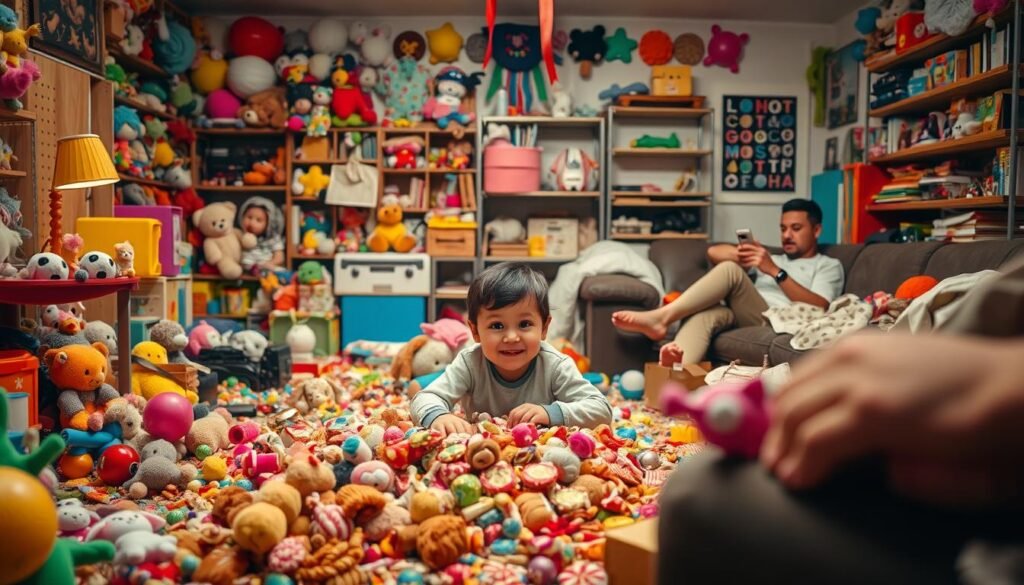What is indulgent parenting, and how does it affect your child’s growth? The term often means being too soft and lenient with kids. This can make them lack self-control and responsibility1. It’s key for parents to grasp this concept and steer clear of it. You might be thinking, am I an indulgent parent, and what signs should I look out for?
Knowing about indulgent parenting and its impact on kids is vital for parents. It can cause many issues, like bad behavior and a lack of self-control2. By recognizing the signs of indulgent parenting, you can act to stop it. This way, your child can grow up to be responsible and disciplined.
Key Takeaways
- Indulgent parenting is a style of parenting that involves being overly permissive and lenient with children.
- Understanding what is indulgent parenting and its effects on children is vital for every parent.
- Indulgent parenting can lead to a range of problems, including behavioral issues and a lack of self-discipline1.
- Being aware of the signs of indulgent parenting can help you take steps to prevent it.
- Indulgent parenting definition is often linked to a lack of structure and discipline3.
What Is Indulgent Parenting? Understanding the Basics
Indulgent parenting, or permissive parenting, means setting low expectations and rarely disciplining kids. This can make kids feel good about themselves and be social, but they might also act impulsively and have trouble controlling themselves4. It’s seen as a way to build a strong bond with kids, but it can also mean too little discipline. This can hurt a child’s growth.
Knowing the signs of indulgent parenting is key. These include being too soft and lenient. It’s important to make sure your child grows up to be responsible and disciplined.
Some signs of indulgent parenting include avoiding fights and being too easy on kids. Research shows kids of permissive parents eat fewer fruits and veggies than others4. For more on good parenting, check out parenting resources that offer tips on being both warm and firm.
It’s important to know the differences between parenting styles, like indulgent parenting. Recognizing its signs and its effects on kids helps you create a better environment for growth5.
Here are some key points to think about when looking at your parenting style:
- Know your parenting style and how it affects your child
- Have clear rules and be supportive and caring
- Teach your child to talk openly and understand their feelings
By paying attention to these points and balancing warmth with discipline, you can help your child become confident, responsible, and self-controlled6.
The Psychology Behind Permissive Parenting Patterns
Parenting styles vary, each with its own set of advantages and disadvantages. Indulgent parenting, or permissive parenting, has become a topic of interest. It involves not setting boundaries and focusing on making the child happy and confident7. While it might seem good at first, studies show it can harm a child’s growth and success later on8.
Permissive parenting can lead to kids being more aggressive and lacking self-control7. They might also make poor choices and act impulsively, seeking approval from others8. Yet, these parents are often warm and supportive, boosting their children’s self-esteem and confidence7.
Let’s look at the good and bad sides of indulgent parenting:
- Children of permissive parents might struggle with organization and habits7.
- This parenting style can lead to more school problems and lower grades8.
- But, it also focuses on the child’s emotional health, which can be beneficial for their self-esteem and social skills7.
Finding a balance between being caring and setting limits is key to good parenting. By knowing the ups and downs of indulgent parenting, you can choose a style that helps your child grow into a responsible and disciplined person78.
Common Signs You Might Be an Indulgent Parent

As a parent, you want the best for your child. But sometimes, this desire can lead to indulgent parenting. This can harm your child’s development, making them lack self-discipline and responsibility.
Research shows that about 70% of parenting experts believe parents misunderstand their roles. They focus too much on academic success and not enough on letting children face consequences9.
Signs of indulgent parenting include avoiding setting boundaries and discipline. Instead, parents try to be their child’s friend. Children of indulgent parents may lack self-discipline and responsibility.
Studies show that permissive parenting can lead to poor academic performance and behavioral problems in children10.
Behavioral Indicators in Parents
Indulgent parents often show certain behaviors, such as:
- Avoiding setting boundaries and discipline
- Focusing on being their child’s friend
- Providing excessive freedom, leading to discipline challenges11
Child Response Patterns
Children of indulgent parents may show certain behaviors, such as:
- Lack of self-discipline and responsibility
- Poor academic performance and behavioral problems10
- Excessive freedom, leading to discipline challenges11
The Short-Term Benefits That Mask Long-Term Problems
Parenting is complex, and avoiding indulgent parenting is key. It might seem good in the short term because it makes kids happy. But, research shows it can harm their self-esteem and confidence12. To prevent this, setting clear rules and being consistent is vital.
A study in the Southeastern United States linked indulgent parenting to unhappy teens13. This can hurt their emotional and mental health, causing anxiety and depression. It also makes it hard for them to grow up responsible and independent13.
- Set clear rules and expectations
- Stick to discipline consistently
- Show them how to be responsible
- Give chances for kids to learn self-control
By doing these things, parents can help their kids become responsible and disciplined. This way, they avoid the downsides of indulgent parenting12.
Indulgent parenting can have severe long-term consequences on a child’s development, making it essential for parents to understand how to avoid this style of parenting and instead focus on setting clear boundaries and discipline, while also being consistent in enforcing them.
Impact on Child Development and Future Success

Indulgent parenting can greatly affect a child’s growth and success later in life. Kids raised with an indulgent style may face challenges in emotional growth, social skills, and making friends14. Studies show that children of permissive parents often feel unhappy and struggle with self-control. They might also take more risks and do poorly in school14.
Research also shows that kids of permissive parents are more likely to be bullied. On the other hand, kids of strict parents might become bullies themselves15. Also, kids raised in strict homes might face emotional abuse in their adult relationships15. But, kids of authoritative parents usually have higher self-esteem than those raised in other styles16.
It’s key to know how indulgent parenting affects a child’s growth and future. This knowledge helps us avoid it and ensure our kids grow up responsible and disciplined. By finding a balanced parenting approach, we can create a supportive environment. This environment helps our kids develop well and succeed in the future14.
| Parenting Style | Impact on Child Development |
|---|---|
| Indulgent | Struggles with emotional development, social skills, and peer relationships14 |
| Authoritarian | Poorer social skills, lower self-esteem, and higher levels of depression15 |
| Authoritative | Stronger self-esteem, better social skills, and higher levels of life satisfaction16 |
Breaking the Cycle: Establishing Healthy Boundaries
Setting healthy boundaries is key to ending indulgent parenting. It means setting clear rules and consequences. It also means showing kids how to behave responsibly. Many parents who try gentle parenting don’t know what they’re doing17. This can lead to too much freedom, which isn’t good for kids.
To set good boundaries, start with rules that fit your child’s age. Make a list of what’s expected and what happens if they don’t follow it. For example:
- Limiting screen time
- Having a regular bedtime routine
- Teaching them to clean up after themselves
By doing this, kids learn to control themselves and take responsibility. This is important for their future. Studies show that setting boundaries and understanding feelings helps kids deal with emotions better17.
Parents should also act responsibly and give kids chances to learn self-discipline. This means getting them involved in household tasks, encouraging smart choices, and praising them when they behave well. By following these steps, parents can stop being too lenient and raise kids who are responsible and disciplined.
Practical Strategies for Balanced Parenting
Understanding what is indulgent parenting is important. Balanced parenting helps raise kids who are responsible and disciplined. Research shows that 66% of U.S. parents find raising kids harder now than twenty years ago18. Setting rules that fit their age is key.
Creating a list of rules and consequences is important. Consistently enforcing these rules helps kids learn self-regulation. This is shown to improve self-regulation by 30-40% in kids from consistent backgrounds19.
Encouraging child independence is also key. This means letting kids make their own decisions and own their actions. Balanced parenting styles aim to balance freedom with guidance. This helps kids become responsible and avoid the dangers of indulgent parenting.
Strategies for Success
- Set clear boundaries and expectations
- Encourage open communication and feedback
- Model responsible behavior and provide opportunities for children to develop self-discipline and responsibility
By using these strategies, you can create a balanced and supportive home. This environment promotes healthy growth and development. The goal is not to be perfect but to make progress in your parenting approach18.
Creating a Supportive Yet Structured Environment
To create a supportive yet structured environment, it’s key to know the signs of indulgent parenting. This type of parenting can hold back a child’s growth. Studies show that kids of permissive parents often struggle with self-control20.
Permissive parenting lacks clear rules and discipline. This makes kids more likely to act out or use drugs20.
A supportive yet structured environment has clear rules and consequences. This style is often called authoritative parenting. It’s linked to better self-esteem and emotional control in kids21.
By setting rules and showing responsible behavior, parents can teach kids self-discipline. For more on parenting styles, check out this resource.
Some key strategies for a supportive yet structured environment include:
- Setting clear boundaries and expectations
- Implementing consistent consequences for misbehavior
- Modeling responsible behavior and providing opportunities for children to develop self-discipline
- Encouraging open communication and emotional expression
By following these steps, parents can build a supportive yet structured home. This helps prevent the signs of indulgent parenting. As research shows, this approach is vital for kids’ well-being. It boosts self-esteem, emotional control, and school success21.
Conclusion: Moving Forward with Mindful Parenting
Parenting teenagers requires finding a balance. You should avoid being too indulgent while setting clear boundaries. Short-term indulgence might seem good, but it can harm your child’s growth in the long run22.
By being more mindful, you can teach your teenager important skills. These include self-control, setting goals, and managing emotions.Check out resources for tips on setting rules, enforcing consequences, and encouraging independence23.
Parenting is not always easy, but it’s worth it. With patience, understanding, and a flexible approach, you can overcome the tough times of adolescence. Use this time to strengthen your bond and guide your teenager towards a bright future22.
FAQ
What is indulgent parenting?
What are the core characteristics of indulgent parents?
How does indulgent parenting differ from other parenting styles?
What are the pros and cons of indulgent parenting?
What are the common signs of indulgent parenting?
How can indulgent parenting affect a child’s development and future success?
How can parents avoid being indulgent?
What are some practical strategies for balanced parenting?
How can parents create a supportive yet structured environment?
Source Links
- Permissive Indulgent Parenting – https://www.linkedin.com/pulse/permissive-indulgent-parenting-monica-brown
- Indulgent Parenting and the Psychological Well-Being of Adolescents and Their Parents – https://pmc.ncbi.nlm.nih.gov/articles/PMC10047057/
- Are You a Permissive Parent? What to Know About the Parenting Style – https://www.parents.com/parenting/better-parenting/style/permissive-parenting-the-pros-and-cons-according-to-a-child-psychologist/
- The 4 types of parenting styles: What style is right for you? – Mayo Clinic Press – https://mcpress.mayoclinic.org/parenting/what-parenting-style-is-right-for-you/
- Pros and Cons of 4 Parenting Styles – https://wellspringprevention.org/blog/pros-cons-parenting-styles/
- The 4 Types of Parenting Styles – https://americanspcc.org/the-4-types-of-parenting-styles/
- Are You a Permissive Parent? – https://www.verywellmind.com/what-is-permissive-parenting-2794957
- Permissive parenting style – https://www.canr.msu.edu/news/permissive_parenting_style
- When Parents Are Too Permissive – https://www.webmd.com/parenting/features/too-permissive-parents
- Permissive Parenting: The Pros and Cons – https://www.healthline.com/health/parenting/what-is-permissive-parenting
- What Indulgent Parenting Has Got In-Store for You | Marriage.com – https://www.marriage.com/advice/parenting/indulgent-parenting/
- Uninvolved Parenting – Psychological Effects On Children – https://wellbeingscounselling.ca/uninvolved-parenting-psychological-effects-on-children/
- Patterns of indulgent parenting and adolescents’ psychological development – https://pmc.ncbi.nlm.nih.gov/articles/PMC10683937/
- How Different Styles of Parenting Impact Children – https://www.verywellmind.com/parenting-styles-2795072
- Baumrind’s Parenting Styles – https://iastate.pressbooks.pub/parentingfamilydiversity/chapter/chapter-1-2/
- How Does a Parenting Style Impact Us In Adulthood? – Flourish Psychology – https://flourishpsychologynyc.com/how-parenting-style-impact-adulthood/
- The Accidentally Permissive Parent – https://www.calmmamacoaching.com/blog/the-accidentally-permissive-parent
- Authoritative Parenting Style vs Permissive: Which is Better for Your Family? » Dr. Steven A. Lazarus, Psy.D., Inc. – https://drstevenlazarus.com/authoritative-parenting-style-vs-permissive-which-is-better-for-your-family/
- The Art of Balanced Discipline: Strategies for Effective Parenting without Power Struggles – Psychologist Gold Coast – CBT Professionals – https://cbtprofessionals.com.au/the-art-of-balanced-discipline-strategies-for-effective-parenting-without-power-struggles/
- What Is Permissive or Indulgent Parenting? How Does It Compare to Guidance Parenting? – Conscious Parenting Revolution – https://consciousparentingrevolution.com/what-is-permissive-or-indulgent-parenting-how-does-it-compare-to-guidance-parenting/
- 4 Types Of Parenting Styles – https://www.parentingforbrain.com/4-baumrind-parenting-styles/
- Indulgent Parenting Style and Its Impact • Encompass Mental Health – https://siouxfallscounseling.com/blog/4-parenting-styles-their-impact-kids-indulgent/
- Examining Parental Internal Processes Associated with Indulgent Parenting: A Thematic Analysis – https://pmc.ncbi.nlm.nih.gov/articles/PMC7731216/








0 responses to “Exploring the Concept of Indulgent Parenting”
Interesting read. But arent we too quick to label parenting styles? What about cultural and socioeconomic factors? They impact parenting too, right?
Honestly, isnt indulgent parenting just another term for spoiling? Do we really need new labels for old concepts?
Interesting read. Could indulgent parenting potentially foster entitlement in kids? Lets not overlook this possibility.